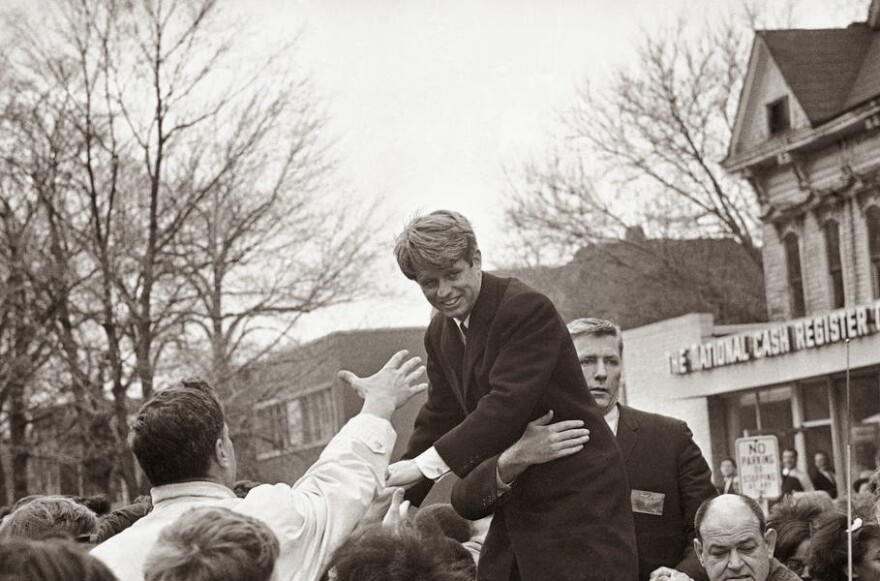When Daniel Greene joined his father, Robert, at the StoryCorps mobile tour booth in Buffalo, he said he wanted to hear more about the individuals who left an impression on his father’s life. One of those individuals was Robert F. Kennedy, who visited Notre Dame where Daniel’s father went to school. On this anniversary of Kennedy’s assassination, we hear how he impacted Robert Greene’s life.
Robert and Daniel Greene recorded their story at the StoryCorps Buffalo mobile tour stop on September 20, 2016.
Originally aired on June 6, 2017 on WBFO.

Read the transcript below:
Robert Greene (RG) and Daniel Greene (DG)
RG: I think because I had both an automobile and a suit, I got asked…
DG: You were a rare class of student at that moment.
RG: Well undergrads usually didn’t have either. So I was invited to be in the motorcade and to escort him.
The crowd was unbelievable. I mean, certainly there were students and people from the university. But there were just hundreds and hundreds of people from the area. It was a challenge just, you know, getting him in and to the stage, and then out afterwards.
DG: I’m sorry, did you meet and greet him somewhere else?
RG: Yes. We were in the motorcade and then we stopped and, you know, got out of the cars and went up to him and went in with him.
I watched – you know, obviously I was interested in the campaign – and I watched all the coverage, and watched the coverage in California where he won and when he was subsequently murdered as he left the stage at the Ambassador Hotel. That was in June, just two months later.
DG: Did that bit of personal connection with him change the way you interacted with him as a candidate and him as a person, as opposed to other politicians before or after?
RG: He was kind of a hero for me. He was very focused, very serious, had a very strong social conscience. A strong family person. So that’s kind of why I liked him in the first place. And, yes, I don’t think my interaction changed that. It just made it a little more personal when you’ve actually met somebody and exchanged, albeit, a few words, but exchanged words with him.
After he was murdered, his body was taken to Saint Patrick’s Cathedral where the public could see and pay their respects. I drove to New York after work. The amazing part was that people were barely whispering. There was no traffic, the streets were closed, and the line just kept going. So we passed the casket and then got in the car and drove back home. And I watched the funeral on television.
The most memorable part of the funeral was probably the train ride from New York City to Washington. Typically, that’s an hour and a half ride. Maybe two hours at most. It took over seven hours because there were so many people. So many people at the side of the tracks in every town, farms, everywhere – saluting, waving, holding signs. So when they arrived for burial at Arlington it was already dark.
I remember as the funeral cortege went by the Lincoln Memorial there was an African-American choir, and they sang what was said to be his favorite hymn, which was the Battle Hymn of the Republic.
It was a sad day. A sad day for me. A sad day for the country.
He modified a quotation from George Bernard Shaw. He used it all the time. I think, maybe in most of his speeches he said something like, “Some people see things as they are and say why. I dream of things that never were and say why not.”
I think if he had lived, I think if he had become president – whether it would have been that year or a subsequent term – hopefully things would have been very different. But we’ll never know.









